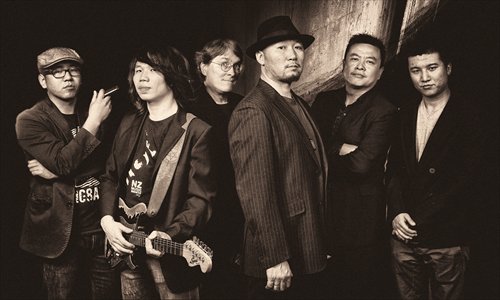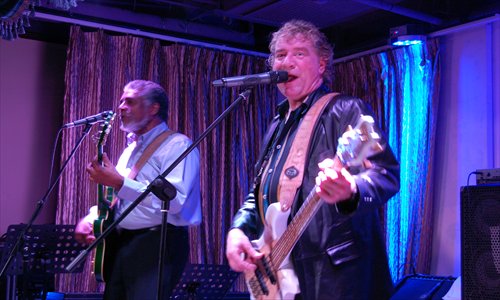Still got the blues

Canadian hard funk blues band LMT Connection closed a blistering headlining set on May 12 with a cover of Ben E. King's famous soul ballad "Stand By Me." As the last chord rung out, rapturous applause erupted at Café CD Blues, located opposite the north gate of Ritan Park, Chaoyang district. For its third consecutive year, the venue is hosting the Beijing CD Blues Festival, which throughout May brings together blues, funk, rockabilly and everything in between.
The sing-along, mostly Chinese crowd embraced the band as they walked victoriously from the stage. In stark contrast, one audience member stood quietly at the bar with his arms folded, his facial expression a look of deep pride. He surveyed the joyous scene with palpable delight as people clambered past him to meet the musicians.
Metropolitan approached the wispy-bearded man, soon attributing his commanding presence to his role as the club's owner. Beijing native Zhang "Big John" Ling, 46, is the brains behind the city's premier blues festival.
"I think there is only one blues," rasped Zhang. "You either play the blues or you don't. I can't describe it. Blues is blues."
Zhang, together with his group The Big John Blues Band, dreams one day of playing their distinctive brand of "Chinese blues" to an audience stateside. "We're working on it. We're trying to get the connections," Zhang explained.

Beijing's 'one-bar' blues
The people behind Café CD Blues (the CD stands for Central District) have been the driving force of the capital's alternative music scene since the 1980s. Since the venue was established in 1995, it has continued to build its reputation as Beijing's unofficial cradle of live blues and jazz, even after relocating in October last year from its previous home south of the Agricultural Exhibition Center.
"It's a Mecca for blues musicians here," said an audience member between mouthfuls of pasta after LMT Connection's set. "It's not exactly a traditional blues bar, but at least it's not really seedy."
Since the blues emerged from African-American communities more than a century ago, the chord-progressive form of music has evolved to become one of the Deep South's most famous exports.
While the blues' humble origins in work songs, field hollers and spiritual ballads might seem a world away from modern life in the Middle Kingdom, the genre still has the power to resonate with Chinese audiences.
"It's difficult," said Zhang of the connection. "I mean, there's no way for us to understand the feeling [in the blues] because we aren't black Americans."
Early influences
Zhang, like many Chinese rock and blues musicians of his generation, said he "found the connection" to blues music in the early 1980s.
"Back then, we would cover AC/DC, Gary Moore and Iggy Pop. But I wasn't aware I was playing it (the blues)," he said.
Much like "father of Chinese rock" Cui Jan, who Zhang still jams with on bass guitar, the Café CD Blues owner was at the forefront of a Western music "revolution" in China during a time when it was still burdened by its capitalist stigma.
Records and cassettes smuggled into China from the US inspired budding local musicians to imitate their foreign idols. Little did they know at the time they were also building their own "blues DNA," said Zhang.
"I was playing the blues long before I was 'playing' it," reminisced Zhang, who in 1996 founded pioneering blues band The Rhythm Dogs, which boasted then-International Monetary Fund vice president John Anderson.
"John's an amazing harmonica player, so it was his idea. We were the first blues band in Beijing," he said.

Cross-cultural appeal
When American journalist and author Alan Paul relocated with his wife and three children to Beijing in 2005, he had no idea he would be a part of China's biggest blues band. Paul, who is now based in New York City, wrote a book about his adventures titled Big In China (2011).
The book served as a memoir to his family's adjustment to expat life in the capital, but it also focused on Woodie Alan - an award-winning blues band Paul formed with three other Chinese musicians, including Dobro guitarist Woodie Wu.
"When I first arrived in Beijing, there was a club at Wangfujing called The Icehouse that was actually bringing in Chicago blues players for long residencies," Paul said of the fledgling blues scene at the time.
Wu, who has since quit music, introduced Paul to Sand, his band at the time, after both struck up a conversation about blues guitarist Stevie Ray Vaughn, whose portrait Wu had tattooed on his arm.
Paul said that a musical approach to "blues with Chinese elements" crept into the band when local bassist Zhang Yong joined.
"He (Zhang Yong) is well versed in classical Chinese music," Paul told Metropolitan via e-mail. "He also plays the guqin (Chinese zither)."
Eventually, Zhang Yong started writing and singing songs in Chinese which, according to Paul, "added a new dimension to the band" and expanded their appeal beyond the expat nightlife crowd.
The most interesting aspect of forming an American-Chinese blues band was the way both national mindsets influenced their music, noted Paul.
"What I taught them in the end was about group collaboration and really jamming," said Paul, recounting how during rehearsals he would encourage the band to listen to each other and play what they felt.
"They were shocked that I asked their opinions on everything, such as if we should start with a bass solo or include a solo in the verse or at the end," he said.
For Paul, establishing a "musical democracy" was a natural approach. "But it was revelatory for the Chinese guys," he said, noting they were used to past Chinese bandleaders "dictating everything."
After just over a year together, expat magazine City Weekend crowned Woodie Alan "Band of the Year" in 2008. Fresh on the back of this success, they toured extensively throughout the country and brought the blues to cities including Suzhou, Xiamen, Hangzhou, Nanjing and Shenzhen.
The positive reception of these shows prompted music website guitarchina.com to opine, "Woodie Alan has really pushed forward the development of blues in China by playing hundreds of well-received shows."
In May 2009, the band released critically-acclaimed debut album Beijing Blues, which garnered celebrity endorsements from international bluesman.
Keeping the dream alive
"The blues represents a culture. It's a way of life with stories behind it," said "Big John" Zhang. "We grew up in a culture without this knowledge, so we didn't get the stories behind it."
Asked whether China would ever see a "blues boom" on a similar scale to the one that unfolded in the UK in the mid-1960s, Zhang offered a thoughtful pause to reflect on such a prospect.
"In China, I still think the blues sounds too simple to a lot of young musicians. They don't even want to try it," he said. "On the other hand, it's difficult because you have to feel it. There is no in between."
Zhang describes music by young indie-rock bands in Beijing as "not easy to listen to" and lacking soul. Not surprisingly, his antidote to the state of modern indie music is more blues.
"That's why I'm doing this," he explained. "I want to build awareness for young people and make it real. I know the blues will really make you play better eventually." The Big John Blues Band is fittingly scheduled to close this year's CD Blues Music Festival on May 25, Zhang said.
Though coy about his group's setlist, a likely song to be performed is "Money" - a raucous blues romp with "Big John's" smoky voice imploring the listener to know he has money. Defying the classic blues theme of being perpetually broke, the song is an apt reminder of the different direction Chinese blues is charting.
"Woodie Wu is a great Chinese bluesman whose guitar and harmonica work could stand up in America or anywhere else," insisted Paul, who for more than 15 years wrote for Guitar World magazine.
Asked when a homegrown bluesman - or even woman in the mold of American "Blues Empress" Bessie Smith - might make it stateside to share Chinese blues with the world, Paul said it was a case of "the sooner, the better." "I wish it were Woodie [Wu]. It breaks my heart that he has stopped playing music," he said.